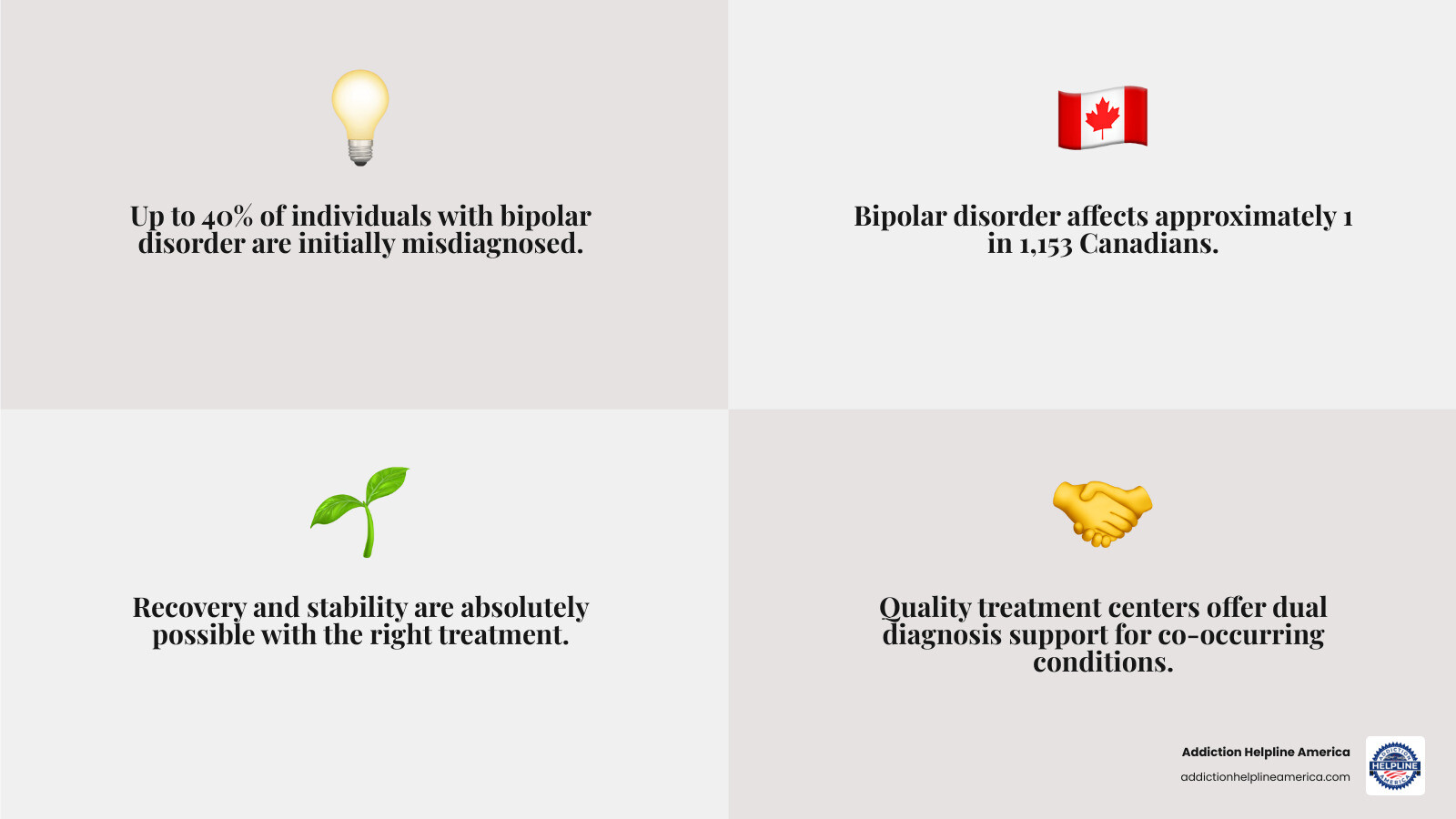
Why Finding the Right Bipolar Treatment Center Matters
A bipolar treatment center provides specialized care for the extreme mood swings of bipolar disorder, helping individuals stabilize symptoms and improve their quality of life. The right center is crucial, as up to 40% of people are initially misdiagnosed. It should offer accurate diagnosis, comprehensive treatment plans (medication, therapy, lifestyle coaching), multiple levels of care, dual diagnosis support, and an experienced staff specializing in mood disorders.
Bipolar disorder causes dramatic shifts between manic highs and depressive lows that can devastate relationships, careers, and daily functioning. Affecting approximately 1 in 1,153 Canadians, the condition can escalate into crisis situations without proper, specialized care.
The good news is that recovery is absolutely possible. With the right combination of medication, therapy, and support, people with bipolar disorder can manage symptoms and live fulfilling lives. The key is finding a bipolar treatment center that offers personalized, evidence-based care.
At Addiction Helpline America, we connect individuals with specialized bipolar treatment centers that provide compassionate, comprehensive care. Our team understands the urgency and works to match you with a program that fits your specific needs.
Bipolar treatment center terminology:
- can a teenager refuse mental health treatment
- can i refuse mental health treatment
- mental hospital near by me
Understanding Bipolar Disorder: Symptoms and Types
Bipolar disorder, or manic-depressive illness, is a complex brain condition causing dramatic shifts in mood, energy, and the ability to function. These shifts occur in distinct episodes, swinging between emotional highs (mania or hypomania) and lows (depression).
During manic or hypomanic highs, a person may feel euphoric and energetic, leading to impulsive decisions. In depressive lows, they may feel overwhelming hopelessness and lose interest in everything. The unpredictable nature of these shifts makes specialized care from a bipolar treatment center essential. Bipolar disorder exists on a spectrum with three main types:
Bipolar I Disorder
This type is defined by at least one full manic episode—a period of at least one week with an abnormally liftd or irritable mood and increased energy. These episodes are severe enough to cause significant impairment in daily life and may require hospitalization. Most people with Bipolar I also experience major depressive episodes.
Bipolar II Disorder
Bipolar II involves a pattern of major depressive episodes and hypomanic episodes. Hypomania is a less severe form of mania, lasting at least four consecutive days. While hypomania doesn’t typically require hospitalization, the depressive episodes can be just as severe and debilitating as in Bipolar I. This often leads to misdiagnosis.
Cyclothymic Disorder
This is a chronic mood disturbance lasting at least two years, characterized by numerous periods of hypomanic and depressive symptoms. These symptoms are milder and don’t meet the full criteria for a hypomanic or major depressive episode, but their persistent, fluctuating nature can still significantly impact quality of life.
A staggering up to 40% of people with bipolar disorder are initially misdiagnosed, often as major depression. This is because people usually seek help during a depressive phase. A thorough assessment at a specialized bipolar treatment center is the best way to get an accurate diagnosis and the right treatment plan.
The Core Components of Bipolar Disorder Treatment
Effective bipolar disorder treatment is a comprehensive, long-term strategy, not a quick fix. The best bipolar treatment center will create a personalized plan combining three core components: medication, therapy, and lifestyle adjustments.
The Role of Medication in Symptom Management
Medication is the foundation of treatment, helping to regulate the brain chemistry that drives mood swings.
- Mood stabilizers (like lithium or certain anticonvulsants) are the first line of defense to even out emotional highs and lows.
- Antipsychotics can be used to control manic episodes and often have mood-stabilizing properties for long-term maintenance.
- Antidepressants may be prescribed for depressive episodes, but with caution. They must be paired with a mood stabilizer to avoid triggering mania, a risk highlighted by Mayo Clinic research: Science Saturday: Could antidepressants cause treatment-emergent mania?
Finding the right medication requires careful medication monitoring. Advances in pharmacogenomics (genetic testing) are also helping to personalize prescriptions and reduce trial-and-error.
Essential Therapeutic Modalities
Therapy provides the skills to manage the psychological and behavioral aspects of the disorder.
- Cognitive Behavioral Therapy (CBT) helps change negative thought patterns and behaviors.
- Dialectical Behavior Therapy (DBT) teaches skills for mindfulness, distress tolerance, and emotion regulation.
- Family-Focused Therapy (FFT) educates family members and improves communication to create a supportive home environment.
- Interpersonal and Social Rhythm Therapy (IPSRT) focuses on stabilizing daily routines (sleep, social activity) to maintain mood stability.
- Psychoeducation empowers you with knowledge about your condition, turning you into an active participant in your recovery.
The Impact of Lifestyle Changes
Daily habits are just as important as medication and therapy. A holistic plan integrates:
- Sleep hygiene: Consistent sleep schedules are critical, as irregular sleep is a major trigger for mood episodes.
- Stress management: Techniques like mindfulness and yoga help manage life’s challenges without destabilizing your mood.
- Routine and Wellness: Regular exercise and a balanced diet support stable energy and overall wellbeing.
These three pillars work together. Medication provides stability for therapy to be effective, therapy provides skills to maintain a healthy lifestyle, and that lifestyle supports overall progress.
Navigating Your Options: How to Choose a Bipolar Treatment Center
Choosing the right bipolar treatment center is a critical step toward recovery. With many options available, it’s important to know what to look for to find a program that fits your unique needs. At Addiction Helpline America, we can help you steer this decision.
Inpatient vs. Outpatient Care: What’s the Difference?
The first choice is the intensity of care you need.
- Inpatient treatment provides 24/7 care in a structured, live-in facility. It is ideal for crisis stabilization, severe mood episodes, or when safety is a concern. This immersive environment allows you to focus entirely on recovery.
- Outpatient treatment allows you to live at home while attending scheduled appointments. It offers flexibility to maintain work or family commitments and comes in various intensities, from Partial Hospitalization (PHP) to weekly therapy. It’s suitable for those with a stable home environment who don’t require constant supervision.
Key Qualities to Look for in a Bipolar Treatment Center
Not all centers are equal. Look for these signs of a high-quality program:
- Accreditation: Ensure the center is accredited by a recognized body like the Joint Commission or CARF, which signifies high standards of care and safety.
- Evidence-based therapies: The program should use proven methods like CBT, DBT, FFT, and IPSRT.
- Licensed, experienced staff: The team should include psychiatrists and therapists who specialize in mood disorders.
- Individualized treatment plans: Avoid one-size-fits-all approaches. Your plan should be custom to your specific symptoms and goals.
- Aftercare planning: A good center prepares you for life after treatment with a solid discharge plan and referrals for ongoing support.
- Family involvement: Programs that include family therapy and education often lead to better long-term outcomes.
- Holistic approach: Look for centers that integrate wellness practices like nutritional guidance, exercise, and mindfulness.
Treating Co-Occurring Disorders at a Bipolar Treatment Center
It’s common for bipolar disorder to exist alongside other conditions. This is called a dual diagnosis. Common co-occurring disorders include:
- Substance use disorders
- Anxiety disorders
- ADHD
- Personality disorders
- Eating disorders
Effective treatment must be integrated, addressing both the bipolar disorder and the co-occurring condition simultaneously by a coordinated team. When researching, ask specifically about a center’s experience with dual diagnosis. The right bipolar treatment center will be equipped to treat your whole picture, not just one part of it.
The Path to Recovery and Long-Term Wellness
While there is no cure for bipolar disorder, recovery is absolutely real and achievable. Modern treatments have dramatically improved the prognosis, allowing people to live rich, fulfilling lives. Recovery is a journey of managing a chronic condition, much like diabetes, through ongoing care and support.
The Power of Family and Social Support
A strong support network is a critical component of recovery.
- Family-Focused Therapy (FFT) helps loved ones understand the disorder, improve communication, and reduce conflict that can trigger episodes.
- Support groups provide a connection with peers who understand the journey, offering practical strategies and hope.
- Building a network of supportive friends, family, and professionals creates a vital safety net. The Centre for Addiction and Mental Health (CAMH) in Canada offers a Mental Health Toolkit with resources for families.
Finding Support and Resources
You are not alone. In Canada, approximately 1 in 1,153 people live with bipolar disorder. National organizations like the Depression and Bipolar Support Alliance (DBSA), the National Alliance on Mental Illness (NAMI), and the Mood Disorders Society of Canada offer education, support groups, and advocacy.
At Addiction Helpline America, we specialize in connecting people with the right bipolar treatment center. Our free, confidential guidance helps you steer the system and find appropriate care.
Latest Research and Advancements
The field of bipolar treatment is constantly evolving, offering new hope.
- New Treatments: Researchers are exploring novel medications and refining brain stimulation techniques like Transcranial Magnetic Stimulation (TMS).
- Personalized Medicine: Pharmacogenomics research, such as the work being done at the Mayo Clinic’s Individualized Medicine Biobank for Bipolar Disorder, studies how genes affect medication response. This could eliminate the trial-and-error process of finding the right drug.
- Better Tools: Advances in neuroimaging and digital health apps are improving diagnostic accuracy and helping individuals track their moods and symptoms.
The best treatment centers stay current with this research, ensuring you receive the most effective care available.
Frequently Asked Questions about Bipolar Disorder Treatment
Facing a potential bipolar diagnosis brings many questions. Here are clear, honest answers to the most common ones.
Is bipolar disorder genetic?
Yes, genetics play a major role. Research suggests genetic factors account for about 80% of the cause, making it highly heritable. If a close relative has bipolar disorder, your risk is higher. However, genes aren’t the whole story. Environmental factors like significant stress, trauma, or substance abuse can trigger the disorder’s onset in someone with a genetic vulnerability.
Can bipolar disorder be cured?
Currently, there is no cure for bipolar disorder. It is a lifelong condition requiring ongoing management. However, this does not mean lifelong suffering. With a consistent treatment plan from a bipolar treatment center—combining medication, therapy, and lifestyle support—most people achieve long-term stability, manage their symptoms, and live full, productive lives. The goal is functional recovery and symptom management, not elimination of the condition.
How is bipolar disorder diagnosed?
There is no simple test for bipolar disorder. Diagnosis requires a thorough evaluation by a qualified mental health professional. This is why up to 40% of people are initially misdiagnosed. The process includes:
- A comprehensive psychiatric assessment of your symptoms, personal history, and family history.
- Mood charting to track mood, sleep, and energy levels over time.
- Ruling out other conditions with similar symptoms, like thyroid issues or substance use disorders.
- Ensuring symptoms meet the specific criteria in the DSM-5.
Given the complexity, getting an evaluation at a specialized bipolar treatment center is the best way to ensure an accurate diagnosis, which is the foundation for all effective treatment. At Addiction Helpline America, we can connect you with experienced professionals who can provide the thorough assessment you deserve.
Take the First Step Towards a Stable Future
Living with bipolar disorder is a challenge, but you don’t have to face it alone, and recovery is absolutely possible. The journey is about learning to manage symptoms, building stability, and creating a meaningful life with the right support. As the stigma around mental health fades, more people are finding the life-changing care they need and deserve.
At Addiction Helpline America, we break down the barriers to finding help. We offer free, confidential, and personalized guidance to connect you with a specialized bipolar treatment center that fits your unique needs, circumstances, and insurance. Our team has vetted programs nationwide and can help you steer your options with confidence.
You deserve to live a stable, fulfilling life. You deserve a care team that understands the complexities of bipolar disorder and treats you with respect. Most importantly, you deserve hope. Let us help you find it.
Our helpline is 100%
free & confidential
If you or someone you care about is struggling with drug or alcohol addiction, we can help you explore your recovery options. Don’t face this challenge alone—seek support from us.
Programs
Resources
Will my insurance
cover addiction
treatment?
We're ready to help
Find the best
drug or alcohol treatment
center
Are you or a loved one struggling with addiction? Call today to speak to a treatment expert.
















